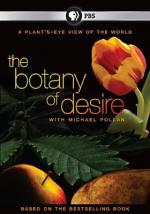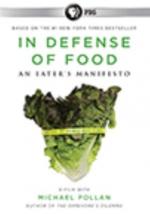- E-movies
- Movies & Television
- Nonfiction
- Connect Your Summer
- Food habits
- food
- health
- Food/Cooking
- Health
- Food
- Movie
- True Facts
April 12, 2016 | Alyssa Y
Learn about your food - where it comes from, how it's made, and the history of how and why we started to eat what we eat - with some of these informative documentaries.
This film shows how human desires are an essential, intricate part of natural history by exploring the natural history of four plants -the apple, the tulip, marijuana, and the potato - and the corresponding human desires - sweetness, beauty, intoxication and control. This two-hour documentary begins in Michael Pollan's garden, and roams the world, from the fields of Iowa to the apple forests of Kazakhstan, from a medical marijuana hot house to the tulip markets of Amsterdam.
"Eat food. Not too much. Mostly plants." These simple words go to the heart of food journalist Pollan's thesis. Humans used to know how to eat well, he argues, but the balanced dietary lessons that were once passed down through generations have been confused and distorted by food industry marketers, nutritional scientists, and journalists. As a result, we face today a complex culinary landscape dense with bad advice and foods that are not "real." Indeed, plain old eating is being replaced by an obsession with nutrition that is, paradoxically, ruining our health, not to mention our meals. Pollan's advice is: "Don't eat anything that your great-great grandmother would not recognize as food."
Discusses the enduring appeal of soul food, and presents an overview of its history, covering its roots in Western Africa, its incarnation in the American South, and the role it plays in the health crisis in the African American community.
In-depth investigation into unlabeled genetically-modified foods which have become increasingly prevalent in grocery stores. Unravels the complex web of market and political forces that are changing the nature of what we eat.
The drive to obtain food has been a major catalyst across all of history, from prehistoric times to the present. Take an enthralling journey into the human relationship to food as you travel the world discovering fascinating food lore and culture of all regions and eras-as an eye-opening lesson in history as well as a unique window on what we eat today.
Explores how large corporations and government agencies control agriculture and food processing, and how those practices affect human, environmental, and economic health.
American food is in a state of crisis. Obesity and diabetes are on the rise, food costs are skyrocketing, family farms are in decline, and our agricultural environment is in jeopardy. Explore a thriving local food movement as our world becomes a more flavorless, disconnected, and dangerous place to eat.
Every year in America we throw away 96 billion pounds of food - 263 million pounds a day. Inspired by a curiosity about society's careless habit of sending good, edible food straight to landfills, the multi award-winning documentary DIVE! follows filmmaker Jeremy Seifert and friends as they dumpster dive in the back alleys and gated garbage receptacles of Los Angeles' supermarkets. In the process, they salvage thousands of dollars worth of good, edible food - resulting in an eye-opening documentary that is equal parts entertainment, guerilla journalism and call to action.
From rooftop farmers to backyard beekeepers, Americans are growing food like never before. Growing Cities goes coast to coast to tell the stories of these intrepid urban farmers, activists, and everyday city-dwellers who are challenging the way this country feeds itself. From those growing in backyards to make ends meet to educators teaching kids to eat healthier, viewers find that urban farming is about much more than simply good food.
Examines the possibility of eliminating diseases like heart disease and diabetes through a plant-based diet.
This chronicles what director Lathe Poland learned after he was diagnosed with Type 2 diabetes. He sought to find out why he got sick, because he didn't fit the classic picture of an adult onset diabetes sufferer. He quickly learned that much of what he knew about healthy eating was based on myths or fifty-year-old science. He searches out why Americas modern food culture is killing us. The upside? There is a lot that can be done!.
An A-to-Z encyclopedia of Raw Food, perfect for beginners and Raw Food enthusiasts.
How do GMOs affect our children, the health of our planet, and our freedom of choice? These and other questions take director Seifert on a journey from his family's table to Haiti, Paris, Norway, and the lobby of agra-giant Monsanto, from which he is unceremoniously ejected. Along the way we gain insight into a question that is of growing concern to citizens the world over: what's on your plate?
Looks at some of the scientific aspects of food, including the chemistry involved in cooking a turkey, the nutritional benefits of cooking, and how taste works.
When a marketing executive for a huge burger chain finds a nasty secret ingredient in their burger recipe, he goes to the ranches and slaughterhouses of Colorado to investigate and finds that the truth is sometimes difficult to swallow.
Americans' right to access fresh, healthy foods of their choice is under attack. Farmageddon tells the story of small, family farms that were providing safe, healthy foods to their communities and were forced to stop, sometimes through violent action, by agents of misguided government bureaucracies, and seeks to figure out why.
Narrated by Katie Couric, the film blows the lid off everything that was known about food and exercise, revealing a 30-year campaign by the food industry, aided by the U.S. government, to mislead and confuse the American public. Exposing the hidden truths contributing to one of the largest health epidemics in history, it follows a group of families battling to lead healthier lives and reveals why the conventional wisdom of 'exercise and eat right' is not ringing true for millions of people.
Frontline investigates the dangerous pathogens in meat, particularly in chicken.

















